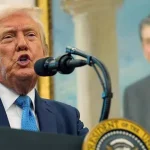In a recent statement, President Trump clarified that he has “no intention” of dismissing Jerome Powell, the Chair of the Federal Reserve. This announcement comes after a period of intense speculation regarding the central bank’s autonomy, which had caused fluctuations in the financial markets.
During a press briefing from the Oval Office, Trump emphasized, “I have no intention of firing him,” while simultaneously suggesting that now would be an ideal moment to consider reducing interest rates. This statement reflects his ongoing concerns about the current economic climate.
Over the past week, Trump has taken to social media to express his dissatisfaction with Powell’s approach to interest rates, arguing that they should be lowered more swiftly. At one point, he even hinted that Powell’s departure would be welcome, stating that his “termination cannot come fast enough.” Such remarks have contributed to market volatility, particularly as investors grapple with the potential economic repercussions of Trump’s extensive tariff policies.
The Federal Reserve has been cautious in its approach to interest rate adjustments, largely due to the implications of tariffs that increase the cost of imported goods. Despite this, Trump has portrayed these tariffs as beneficial for the nation, asserting that they are advantageous for American workers and the manufacturing sector.
“We are generating significant revenue from tariffs,” Trump remarked during his address, reinforcing his stance on the issue.

A Complex Dynamic
The relationship between President Trump and Jerome Powell has been fraught with tension, despite the fact that Trump was the one who nominated Powell to lead the Federal Reserve during his initial term. Trump has consistently criticized the central bank for not maintaining lower interest rates and has expressed a desire to influence monetary policy.
However, the Federal Reserve is structured to function independently from political influence, allowing it to make necessary but potentially unpopular decisions to combat inflation effectively. Powell has made efforts to navigate this challenging relationship without provoking the president, yet he remains committed to fulfilling his term, which is set to conclude in May of the following year.
Powell has asserted that the president lacks the authority to terminate him without just cause, which typically involves misconduct. This interpretation is supported by existing Supreme Court rulings. Nevertheless, the White House has indicated a readiness to challenge this precedent, having previously dismissed members of other independent agencies, which raises concerns about the potential for Trump to attempt to remove Powell from his position.

